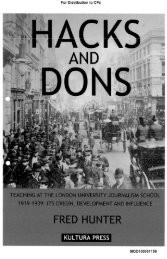The Edi ' - The Leveson Inquiry
The Edi ' - The Leveson Inquiry
The Edi ' - The Leveson Inquiry
Create successful ePaper yourself
Turn your PDF publications into a flip-book with our unique Google optimized e-Paper software.
Perso~sa~ an~ ~s~e~udicec~<br />
For Distribution to CPs<br />
"~he aim of Clause 12 is to protect individuals from<br />
~discriminatory coverage and no public interest defence s<br />
available. However, the Code does not cover generalised remarks<br />
about groups or categories of peep]e, which would invo]ve<br />
suojectiveviews, often based on po]itical correctness or taste, and<br />
oe difficult to ad.udicate upon without infringing the freedom of<br />
expression of others.<br />
As always, the Code is striking a balance between the rights of<br />
the public to freedom of speech and the rights of the individua~ -- in<br />
this case not to face persona] discriminatory abuse. Freeoom of<br />
expresston must embrace the fight to hold views that others might<br />
find distasteful and sometimes offensive.<br />
<strong>The</strong> Code Committee’s approach has a]ways been that. in a free<br />
sing the Importance<br />
overing high profile<br />
ro 9~ saccer<br />
beer represented as<br />
chair nan, sour~ded a<br />
spolts fans to<br />
JuSt ( omment about<br />
ho~ "~ans should<br />
partl: an fashion the<br />
~=ntin, I their country,<br />
¯ to -<br />
"~ inci :ement.<br />
he to ~ing down of<br />
ff jint oistic<br />
its bc fore 1998.<br />
society with a diverse press, subjective issues of taste and decency<br />
should be a matter for editors’ discration. And with newspapers and<br />
magazines constantly answerable in the court of public opinian,<br />
there is ample evidence that editors exercise that discretion on a<br />
daily oasis.<br />
For example, although :British newspapers and magazines were<br />
free under the Code to pub sh the controvers a Dan sh cartoons ef<br />
the Prophet Mohammed. none chose to do so. It was the exercise of<br />
Th e p ar~e<br />
cotour code<br />
discretionary editorial judgment.<br />
By the same standard, a national newspaper columnist was free<br />
~ What the<br />
Code says<br />
to suggest, wrily, that piano wire should be strung across country<br />
lanes to decapitate cyclists. His comments caused widespread<br />
outrage, but did not breach the Code becausethey were not aimed<br />
at any named individuals, However, faced with the wrath of hundreds<br />
~.~>;. Key<br />
eueshons<br />
of reaoara, the writer voluntarily apo}oglsed for any unintended<br />
issues arise<br />
offence caused.<br />
<strong>The</strong> PCC has a~ways upheld the press’e right to make robust,<br />
generalised remarks, when clearly presented as comment, in the<br />
name of free speech.<br />
Briefings<br />
n sDecifi(<br />
areas wnere<br />
the Code<br />
app es<br />
However, the same does not apply to pejorative or prejudicial<br />
attacks directed at nameo individuals. So when a ad’s mag<br />
published a sticker poking fun at the disabled son of Katie Price -the<br />
glamour model Joroan -- the PCC received 143 complaints,<br />
including from Ms Price and her husband. Peter Andre. <strong>The</strong> issue<br />
was swiftly reso]ved when the magazine published an apology online<br />
and in the magazine ano made a donation to charity. U!Jc# ;~,<br />
Individuata only: One of the strengths of the Cooe ~s the<br />
protection that t g~ves specifically to personally affected<br />
individuals But inevitably that means that some third party<br />
comotaints cannot succeed. <strong>The</strong> PCC will not oroceed with a thirdparty<br />
complaint without the subject’s consent.<br />
Although the Code does not cover complaints about groups of<br />
people= where the main objection is often against the tenor of<br />
reporting, the PCC sometimes addresses these wider issues via<br />
runngs on individual cases and guidance notes.<br />
It has made clear that even if there may be no claim under the<br />
discrimination clauses, there may be a case under other sections of<br />
the Code, such as Accuracy -- if statements are incorrect or<br />
comment is passed off as fact.<br />
its guidance note on asylum seekers, for example, (See ~n:efin9<br />
#anal. Asy£~m Seekers i suggested it was inaccurate to describe<br />
people as illegal asylum seekers <strong>The</strong>y could not be itlegal unless<br />
they had been refused asy=um -- which, by definition, asylum<br />
seekers bad not. It has suggested some stories risked breaching<br />
the Code’s privacy rules, and publication in other cases could<br />
involve a threat to chiidran’s welfare.<br />
<strong>The</strong> Commission has also warned against the gratuitous use of<br />
insensitive language -- such as referring to mental health patients<br />
(Sae E~riai~ng pane~: Mental Health) as basket-cases, nuttera or<br />
psychos -- Which could be discriminatory or inaccurate.<br />
P~]udicial er peja~tive; Not all references to an individual’s race,<br />
celour‘ religion, gender, sexual orientation, or to any physical or<br />
mental illness or disability, need to be avoided under the Code. To<br />
be in breach Of sub-clause 12i, they must not only be prejudicial or<br />
pejorative -- but also in a discriminatory manner,<br />
MAD100036608
















